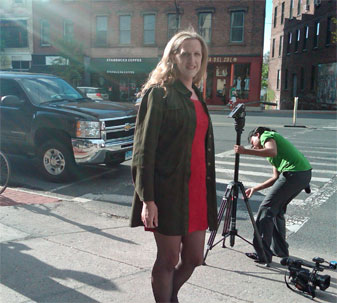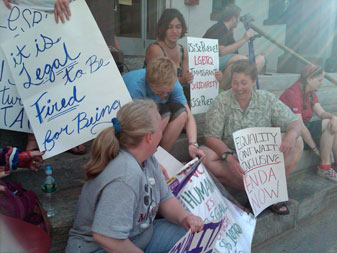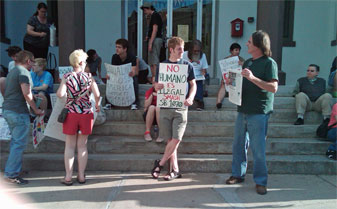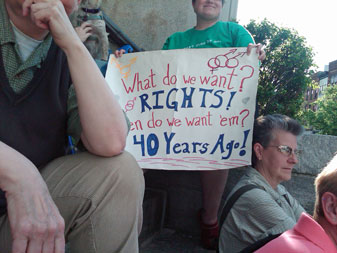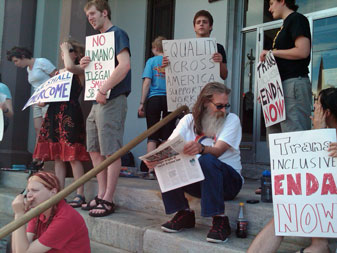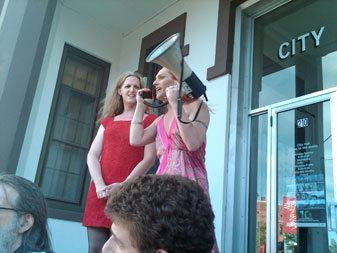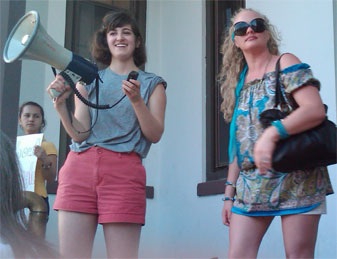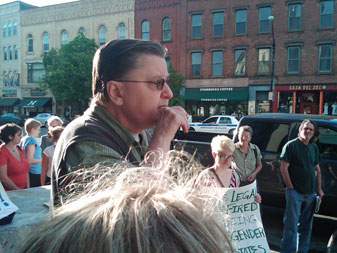From the April 29 issue of Religion Dispatches comes this story by RD associate editor Sarah Posner:
Last week, the Supreme Court heard oral arguments in Christian Legal Society v. Martinez, a case closely watched by both the religious right and civil liberties advocates. At issue in the case is whether the Hastings College of Law, part of the University of California system, violated the CLS’s First Amendment rights by requiring that the Society comply with the school’s non-discrimination policy in order to receive official school recognition as a club.
Hastings, a state-funded institution, requires school clubs, in order to receive the benefits of official recognition, to adhere to the policy which prohibits discrimination on the basis of, among other things, religion and sexual orientation. CLS, which requires members and those wishing to hold leadership positions in the club to be professing Christians and to disavow “unrepentant participation in or advocacy of a sexually immoral lifestyle,” requested an exemption from these provisions in 2004, which Hastings refused. Although Hastings never denied CLS access to and use of school facililities, the decision meant CLS could not make use of benefits offered to official school clubs, including limited funding from student activity fees. CLS sued in October 2004, lost both at the trial and appellate court levels, and then appealed to the Supreme Court.
CLS’s mission, according to its Web site, is “to inspire, encourage, and equip lawyers and law students, both individually and in community, to proclaim, love and serve Jesus Christ through the study and practice of law, the provision of legal assistance to the poor, and the defense of religious freedom and sanctity of human life.” Through its Law School Ministries, it “encourages students in faith, connection with Christian mentors, professional development, exposure to other Christian students, and future employment. As many secular law schools have abandoned traditional education concerning the origins of law, increasing emphasis is placed on the foundations and practices which integrate faith and practice.”
…
Read the rest of the story here . Basically, CLS is arguing that it should have the freedom to uphold certain faith-based moral standards for its members, or else its mission is in jeopardy. Almost by definition, if their values weren’t somewhat different from the values of the secular university, CLS wouldn’t need to exist. Meanwhile the ACLU legal expert makes the point that in past generations, business owners who opposed equal pay for women or equal treatment for black customers also sometimes claimed religious exemptions, and it’s a good thing they didn’t succeed. Both sides have some merit, I think.
This story made me remember the young libertarian college student I used to be, who would have come down firmly on the side of CLS. While I always supported gay rights in theory, the issue occupied a much smaller place in my consciousness. The power imbalance that truly incensed me was the power of the institution over the dissenting individual.
I wasn’t yet a Christian, though inching in that direction; my primary religion was the creative life of the mind. I believed in the university as a temple devoted to the pursuit of truth (hey, I was 18). I was infuriated to find that in practice, we had to finesse our real opinions all the time in order to avoid a bad grade that would hurt our employment chances after college, negating our parents’ incredible financial sacrifices for our education. Where did our moral obligations lie – with the truth or with family loyalty?
So, freedom of conscience was very much on my mind. I was also alert to the paradoxes of “liberal tolerance” so incessantly pointed out by Stanley Fish: in the name of “freedom” and “equality”, the administration might use its unequal power to suppress some student perspectives and constrain their ability to act with integrity.
But when you’re a student, you think the university is the entire world, and it revolves around your issues. At least it was like that for me. Non-affirming conservative Christians may well be an oppressed minority on college campuses, but they are the oppressive majority in the rest of America. This is not to say that two wrongs make a right. It’s just important to remember the wider context. CLS presumably wants its members to use their legal skills to block full civil equality for GLBT people when they graduate. Their gathering is not just about personal self-expression.
Now that I am older, queerer, and more politically aware, what do I think the correct outcome should be? Personally, I wish both sides would stand down. It’s unfortunate that the Supreme Court will end up settling what is really a political balancing act rather than a question of constitutional law.
To CLS, I would say, “Suck it up.” It’s a bit disingenuous to define yourself in opposition to liberal-pluralist values, and then invoke those values to win the freedom to discriminate. The hardship you’re being asked to suffer for your faith is relatively minor. It would be a different story if the students were actively penalized for joining CLS, or for expressing their views in the classroom in a non-hostile way. Here, a completely optional extracurricular activity is merely being denied certain privileges.
You kids might also want to reconsider making homophobia the litmus test for Christian purity. You can’t imagine how many people close their minds to the gospel because Christians have such a hateful reputation.
To Hastings College, I would say, “Face your fears.” Don’t act so afraid of controversial viewpoints. Promote dialogue between the CLS and gay student groups. Facilitate debates about different visions of society and how religion should interact with law and politics. After all, anti-gay Christians are out there in the real world. By suppressing those voices on campus (beyond what’s necessary to prevent harassment), are you really equipping your students to handle them as adults?
